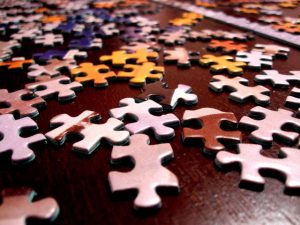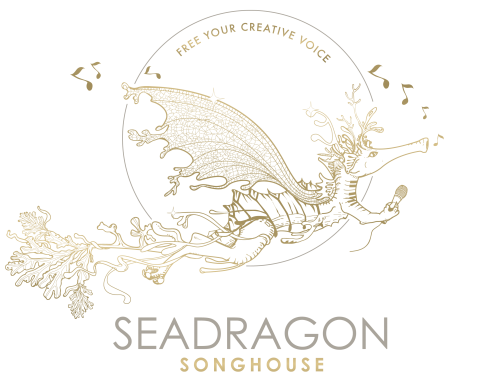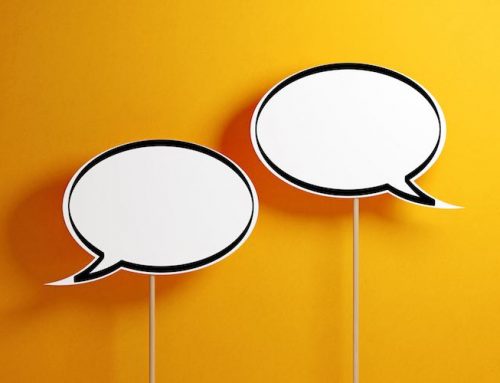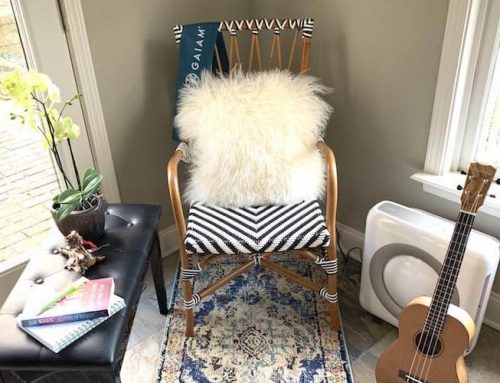
February 19, 2019 by Courtney Cutchins
Focus vs. Fixation: How Songwriting is like a Jigsaw Puzzle
My family and I have this tradition of working on a jigsaw puzzle together during the colder months. Whether it’s a dolphin leaping over the moon or a wizard casting spells in a snow globe, we wind up agonizing over it for a good week or two as it sits on my mom’s kitchen table. It’s serious business – and I have a love/hate relationship with the whole process. On one hand, it’s nice to focus on a gigantic, galactic tiger while procrastinating on all the work to be done – and on the other hand, it tests my patience like few other things can. Why is this straight part not an edge piece? Why are there purple, swirly bits in two completely different areas? Where does this random black line go? Why can’t I find this piece that should be totally obvious? My perfectionistic tendencies take over and drive me crazy. We’ll call this whole experience: “Extreme Puzzling.”
Recently, this puzzling process reminded me of something else… Writing a song! Once I made this connection, the similarities between the creative process of songwriting and the solving of a jigsaw puzzle were numerous. Do puzzles make us better songwriters? Does music make us better puzzle solvers? I’m going to say yes and yes – and wanted to share my observations below.
1. Shape vs. Color vs. Context
So – you’ve got an empty space and you know a puzzle piece goes there. Do you look at the physical shape of the piece? Do you look at the color of the piece and how it compares to the one next to it? Or do you look at the overall context of where the piece is going – is it part of a kitten or a sports car or a fence post? In all likelihood, you’re attempting to consider all of these things at once. However, you’ll be more successful if you focus on just one of these perspectives at a time, depending on the challenge at hand.
Much like writing a song, it’s necessary to choose a specific focus or perspective. Am I thinking about the melody or rhythm at this point? Am I considering the lyric? Or maybe the chords or the story or the overall emotional vibe? There are so many ways to fill in the blank spaces! As songwriters, we’re often switching through many different approaches simultaneously, which can make the process challenging to navigate – which leads me to my next point…
2. Be Flexible
There’s a huge difference between focus and fixation. Focus is when you choose a perspective to guide you through the decisions you’re making. Focus is totally necessary – and adaptable. Fixation, on the other hand, is when you believe your chosen perspective is the only and absolute way. Fixation is not flexible – and it limits your creativity, which leads to frustration and the infamous “writer’s block.” Or, “puzzler’s block.” If you’ve ever solved a jigsaw puzzle before, you know exactly what I mean. You sit and stare at that one wonky-shaped spot for so long that you’re just sure you’ll be able see the piece that fits it. When you don’t, despair, regret and fear immediately set in – the piece is missing, you’ll never find it, why did you even start this puzzle to begin with, how could you waste so much time on this, what if you never finish this song – ahem, puzzle – and it just wastes away on your kitchen table until, defeated, you slide it back into the box? This downward spiral is always fun for self-psychoanalysis – but it’s unnecessary. Which leads me to point #3…
3. Walk Away (It’s Okay!)
Step away from the puzzle. Get up and leave. Go for a walk, brush your teeth, wash the dishes, pet the dog, go to the grocery store – any simple jobs that can get you moving forward. These accomplishments, no matter how small, get us out of “fixation” mode and back into “hey, I’m a capable human being!” mode. Why do we sit there, whining and complaining, beating our head against a wall, feeling stuck, when we can easily and actively leave the situation? Is it fear of failure? Or fear of losing inspiration or motivation? Is it because we, as a society, frown upon taking breaks?
The coolest thing is, after a good break, you come back and get 10 pieces in one fell swoop. Similarly, with songwriting, you’ll often come back to your work and hear a solution that you couldn’t have imagined an hour earlier. Repeat after me: breaks are important, breaks are good, you’re allowed to take breaks, take breaks often, breaks do not mean you’re lazy, breaks mean that you’re taking care of yourself. (Rest is important, too. Also, that’s definitely a separate blog post for another time.)
4. Don’t Throw the Pieces Away
Along the same lines, when you’re having your creativity tantrum, don’t throw the pieces away! How many times I and so many other songwriters take a perfectly good idea and criticize it, erase it or forget it. This is definitely a lesson to learn from a jigsaw puzzle because every piece counts. Just because a piece doesn’t fit in one spot doesn’t mean it won’t be useful somewhere else. Now, I realize the puzzle-song analogy is a stretch here because the puzzle requires a certain number of pieces while the song, technically, does not. However, consider how your songwriting process could be enhanced by viewing your ideas as separate, valuable, inspired pieces, rather than disposable bits of information subject to your approval. How would that change your process or mindset? Would you take better care of your ideas? Would you record them more often? Or write more of them down?
5. Teamwork
Lastly, don’t underestimate the value of teamwork. Don’t worry – as an introvert, I bristle a bit at this one, too. What do I do when working on music? I happily isolate myself with my thoughts and imagination. But when have I ever just sat down to work on a puzzle all by myself? Hardly ever. With a puzzle, I get to spend time with the people I care about. When I work with others, the puzzle gets done a lot faster. A great way to get a puzzle done is by setting it out during a holiday house party and watching your guests do all the work for you – and they’re having fun while doing it! (Or they may be in some phase of the process we just discussed – so maybe they’re not having fun – it’s hard to say!)
I’m not necessarily advocating for writing a song with your colleagues (though that’s a unique process that’s definitely worth trying!) However, when writing a song, I can move through my creativity tantrum a lot faster by reaching out to friends or other musicians. It’s important to note how valuable it is to feel supported by some form of team in your life. Do you have people that help you solve puzzles? Do you have friends or family who encourage your music-making? Can you provide this sort of support and encouragement to others? ♥ (Time for a shameless plug! At Seadragon Songhouse, this is one of our very favorite services we offer: creativity coaching that helps you work through all the puzzles in your musical life!)
A good reminder through all of this is that creative works and projects are always a process – and it’s never without its challenges. It takes time, energy, patience, analysis, logic, flexibility and vision. It’s hard work – and it’s not always fun – but it shouldn’t be miserable, either! Be sure your process is helping you move in the direction of your goals. Now – go get yourself a jigsaw puzzle – or write yourself a song – and tell us about your experience below in the comments!
Sign up for our newsletter to have blog posts and creative ideas delivered right to your inbox. We love to stay connected!




